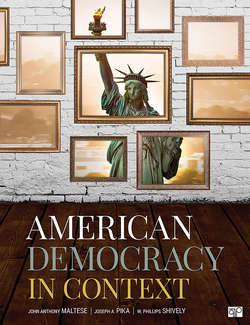Читать книгу American Democracy in Context - Joseph A. Pika - Страница 168
На сайте Литреса книга снята с продажи.
Slavery and the Supreme Court
ОглавлениеProponents of slavery generally embraced states’ rights, but they did champion one aspect of national supremacy: the power of Congress to enforce the fugitive slave clause of the Constitution through legislation such as the Fugitive Slave Act of 1793. This, they argued, prevented states from passing laws, such as one enacted by Pennsylvania in 1826, to protect the due process rights of African Americans. The Supreme Court invalidated the Pennsylvania law in 1842, arguing that the federal government had exclusive power to regulate the return of fugitive slaves.5
A year earlier, the Supreme Court had ruled in favor of 53 Africans who, on the slave ship Amistad bound for Puerto Principe, Cuba, had revolted, killed the captain, and tried to return the ship to Africa but ended up in the United States instead. There, proslavery advocates deemed the men slaves and wanted them tried for mutiny, murder, and piracy. Abolitionists, on the other hand, viewed the men as victims: freemen who had been kidnapped and therefore had a right to resist their captors. The Supreme Court sided with the abolitionists. It freed the Africans and allowed them to return to Sierra Leone.6
The Amistad case was a rare Court victory for abolitionists, who suffered a stinging defeat in Dred Scott v. Sandford (1857), one of the most infamous decisions ever handed down by the Supreme Court. The case involved Dred Scott, who had been born a slave in Virginia and had been sold to an army surgeon, John Emerson, in 1832. Emerson’s military career took him to Illinois and the Wisconsin territory, where slavery was banned. Eventually, while serving in the Seminole War, Emerson left Scott with Emerson’s wife in St. Louis, Missouri. Emerson died in 1843, and Scott tried to purchase his freedom from Mrs. Emerson. She refused, and Scott subsequently sued for his freedom, citing precedents in Missouri case law holding that slaves brought to Missouri after having resided in free states (such as Illinois) or territories were entitled to their freedom.
Chief Justice Roger Taney (left) ruled that Dred Scott (right) and all African Americans were a “subordinate and inferior class of beings” who did not have the right to sue in federal court.
Hulton Archive / Getty Images
The Missouri trial court ruled in favor of Scott, but the Missouri Supreme Court overturned the ruling and abandoned earlier “once free, always free” precedents. The U.S. Supreme Court affirmed that ruling. In so doing, it could have simply declared that the Missouri Supreme Court had the final word on Missouri law. Instead, in an opinion written by Chief Justice Roger B. Taney, the Supreme Court issued a sweeping ruling that deemed African Americans a “subordinate and inferior class of beings” who were—even if they were free blacks—disqualified from U.S. citizenship and therefore unable to sue in federal court.7 Moreover, the Court ruled that Congress had exceeded its authority when it passed the Missouri Compromise and explicitly held that slaves were property whose owners deserved constitutional protection.8
Reaction to the Dred Scott decision was fierce. It crystallized attitudes on both sides of the slavery issue and, many argue, made the Civil War inevitable. That war was largely, but not exclusively, a battle over slavery. President Abraham Lincoln issued the Emancipation Proclamation in September of 1862 freeing slaves in all Confederate states that did not return to Union control by January 1, 1863. Notably, the Emancipation Proclamation did not free slaves in Union states. The complete abolition of slavery did not come until after the Union victory in the Civil War, with the ratification of the Thirteenth Amendment to the Constitution on December 6, 1865.
Thirteenth Amendment The constitutional amendment that abolished slavery and other forms of involuntary servitude.
Fourteenth Amendment The constitutional amendment containing the guarantees that no state shall deprive any person of the equal protection of the law nor deprive any person of life, liberty, or property without due process of law.
Fifteenth Amendment The constitutional amendment guaranteeing that the right to vote will not be denied based on race, color, or previous condition of servitude.
